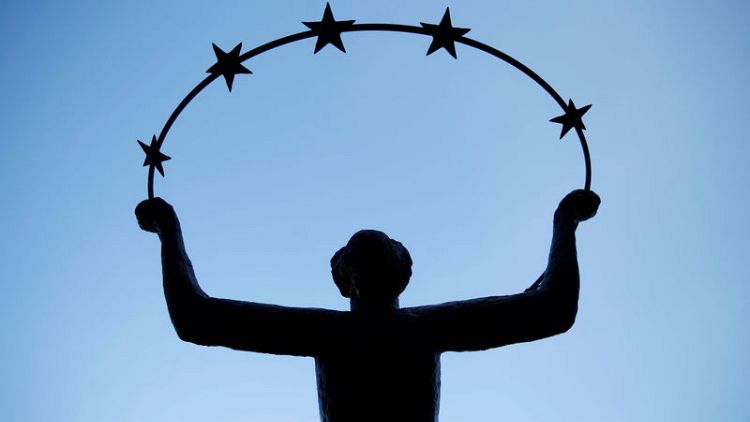By Alastair Macdonald
BRUSSELS (Reuters) - Europeans start voting on Thursday in four days of elections to the EU parliament that will influence not just Brussels policy for the next five years but, to some extent, the very future of the Union project itself.
In 2014, nationalists hostile to the EU doubled their presence in the assembly, topped the poll in Britain and won a referendum there that yanked out one of the bloc's biggest members. Almost.
Five years on, polls show eurosceptics gaining again. But Brexit is yet to happen, and may not; Brussels' enemies will still struggle to top 20%; and the far-right goes into the weekend hit by scandal over its Austrian flagbearer's videotaped collusion with a supposed Russian oligarch's niece eager to buy favour.
Others who want to halt or reverse federalist trends if not scrap the European Union altogether, also face headwinds. Some who are tasting national power must also face disillusioned supporters - notably Italy's co-rulers the League and 5-Star.
The European project is facing a list of challenges, including unprecedented transatlantic slights from a U.S. president who fetes Europe's populists, border rows over migrants and an economy hobbled by public debt and challenged by the rise of China.
But parties seeking collective continental action on shared issues such as trade, security, migration or climate change should still dominate the chamber, albeit with a smaller overall majority.
NATIONALIST TIDE
Europeans are preparing to remember events that shaped the Union - 75 years since Americans landed in France to defeat Nazi Germany and since Russian forces let the Germans crush a Polish bid for freedom; 30 since Germans smashed the Berlin Wall to reunite east and west Europe.
But memories of wars, hot and cold, have not sufficed to build faith in a united future. Jean-Claude Juncker, the Luxemburger who will be replaced as EU executive head after the election, warns of a rising tide of nationalism, not just on the fringes.
Mainstream parties pushing closer integration of the euro currency economy are struggling to capture the imagination of a public jaded with political elites.
Describing it as "undoubtedly the most important" since the first such election in 1979, centrist French President Emmanuel again Macron flourished the standard he has raised for Europe, calling on Thursday for cooperation from conservatives, socialists and Greens to face down a caucus of anti-EU forces.
"In today's world we need a stronger, more united Europe," Macron told Belgium's Le Soir newspaper. Asked if he believe his opponents destroy the EU, he replied: "Of course."
He need look no further than home turf to see the threat. Marine Le Pen's National Rally hopes to top the French EU poll, again. And she is delightedly telling voters that she will find many more allies to block what she calls a "rush to federalism".
BREXIT BALLOT
Matteo Salvini's League may pip the Christian Democrats of German Chancellor Angela Merkel, the bloc's power broker beset by nationalists to her right, to become the biggest single party in the 751-seat chamber.
Right-wing ruling parties in Poland and Hungary, defying Brussels over curbs to judicial and media independence, will also return eurosceptic lawmakers on Sunday.
The anti-EU Brexit Party could also finish in first place in Britain - though the circumstances surrounding the election there are verging on the absurd. Britons will kick off the voting on Thursday two months after they were supposed to have left the EU. They will be choosing 73 MEPs who cannot be sure of even taking their seats in July.
The results should be clear by late on Sunday, ushering in weeks of bargaining, among parties to form a stable majority in the Parliament, and among national leaders to choose successors to Juncker and other top EU officials.
While many Europeans may remain indifferent to the doings in Brussels, governments in Moscow, Washington, Beijing and elsewhere will be watching closely for signs of political weakness, or strength, in the world's biggest economic bloc.
(Editing by Andrew Heavens)
